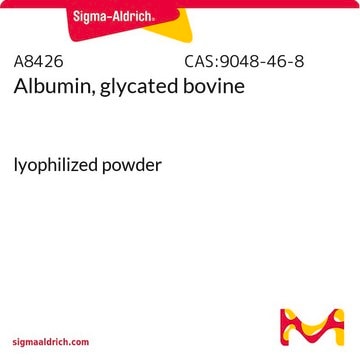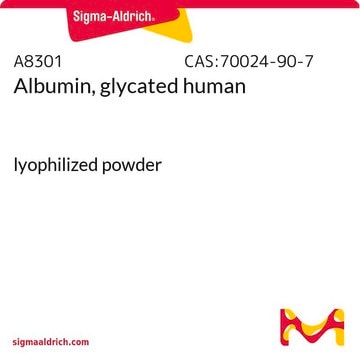121800-M
Advanced Glycation Endproduct-BSA
AGE-BSA has been reported to induce apoptosis in cultured human umbilical vein endothelial cells and inhibit nitric oxide synthase activity in proximal tubular epithelial cells.
Szinonimák:
AGE-BSA
Bejelentkezésa Szervezeti és Szerződéses árazás megtekintéséhez
Összes fotó(1)
About This Item
UNSPSC kód:
12352202
NACRES:
NA.25
Javasolt termékek
Minőségi szint
Teszt
≥95% (SDS-PAGE)
Forma
liquid
gyártó/kereskedő neve
Calbiochem®
tárolási körülmény
OK to freeze
avoid repeated freeze/thaw cycles
tárolási hőmérséklet
−70°C
Általános leírás
Prepared by reacting BSA with glycoaldehyde under sterile conditions. Glycated-BSA shows a 5,000 - 10,000% increase in fluorescence as compared to normal BSA (confirmed by fluorescence spectrophotometry, excitation/emission 370/440 nm). AGE-BSA has been reported to induce apoptosis in cultured human umbilical vein endothelial cells and inhibit nitric oxide synthase activity in proximal tubular epithelial cells. Advanced glycation end products and their receptors have been implicated in the pathogenesis of diabetes, induction of proinflammatory cytokines, and stimulation of smooth muscle proliferation, and fibronectin production.
Prepared by reacting bovine serum albumin (BSA) with glycoaldehyde under sterile conditions. Fluorescence of AGE-BSA is confirmed by fluorescence spectrophotometry, excitation/emission = 370/440 nm. Glycated BSA shows a 5000-10,000% increase in fluorescence compared to control BSA. AGE and their receptors have been implicated in the pathogenesis of diabetes, induction of pro-inflammatory cytokines, and stimulation of smooth muscle proliferation and fibronectin production. AGE-BSA has also been shown to induce apoptosis in cultured human umbilical vein endothelial cells (HUVEC) and inhibit nitric oxide synthase activity in proximal tubular epithelial cells of the kidney.
Figyelmeztetés
Toxicity: Standard Handling (A)
Fizikai forma
In sterile-filtered PBS.
Egyéb megjegyzések
Okamoto, T., et al. 2002. Microvasc. Res.63, 186.
Ohgami, N., et al. 2001. J. Biol. Chem.276, 3195.
Wang, R., et al. 2001. J. Nippon Med. Sch.68, 472.
Sakata, N., et al. 2000. J. Atheroscler. Thromb.7, 169.
Verbeke, P., et al. 2000. Biochim. Biophys. Acta1502, 481.
Farboud, B., et al. 1999. Mol. Vis.5, 11.
Huang, J.-S., et al. 1999. Biochem. J.342, 231.
Min, C., et al. 1999. Diabetes Res. Clin. Pract.46, 197.
Neumann, A., et al. 1999. FEBS Lett.453, 283.
Stitt, A.W., et al. 1999. Biochem. Biophys. Res. Commun.256, 549.
Nazaimoon, W. and Bak, K. 1998. Malays. J. Pathol.20, 83.
Ohgami, N., et al. 2001. J. Biol. Chem.276, 3195.
Wang, R., et al. 2001. J. Nippon Med. Sch.68, 472.
Sakata, N., et al. 2000. J. Atheroscler. Thromb.7, 169.
Verbeke, P., et al. 2000. Biochim. Biophys. Acta1502, 481.
Farboud, B., et al. 1999. Mol. Vis.5, 11.
Huang, J.-S., et al. 1999. Biochem. J.342, 231.
Min, C., et al. 1999. Diabetes Res. Clin. Pract.46, 197.
Neumann, A., et al. 1999. FEBS Lett.453, 283.
Stitt, A.W., et al. 1999. Biochem. Biophys. Res. Commun.256, 549.
Nazaimoon, W. and Bak, K. 1998. Malays. J. Pathol.20, 83.
Jogi információk
CALBIOCHEM is a registered trademark of Merck KGaA, Darmstadt, Germany
Tárolási osztály kódja
12 - Non Combustible Liquids
WGK
WGK 2
Lobbanási pont (F)
Not applicable
Lobbanási pont (C)
Not applicable
Analitikai tanúsítványok (COA)
Analitikai tanúsítványok (COA) keresése a termék sarzs-/tételszámának megadásával. A sarzs- és tételszámok a termék címkéjén találhatók, a „Lot” vagy „Batch” szavak után.
Már rendelkezik ezzel a termékkel?
Az Ön által nemrégiben megvásárolt termékekre vonatkozó dokumentumokat a Dokumentumtárban találja.
Tudóscsoportunk valamennyi kutatási területen rendelkezik tapasztalattal, beleértve az élettudományt, az anyagtudományt, a kémiai szintézist, a kromatográfiát, az analitikát és még sok más területet.
Lépjen kapcsolatba a szaktanácsadással








